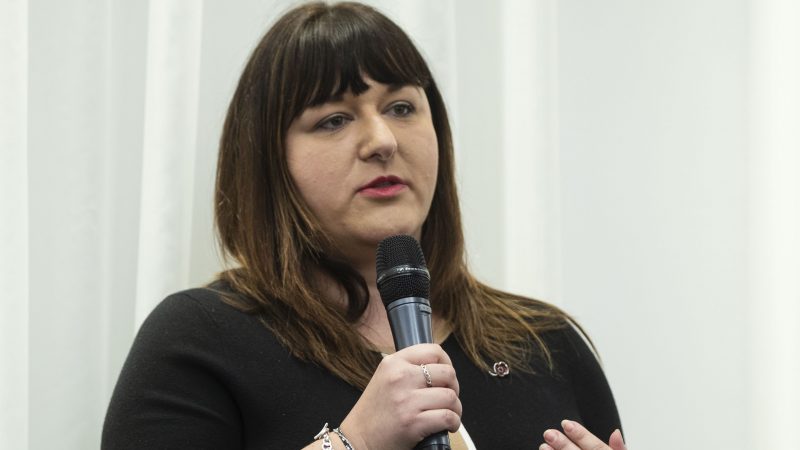
The vice-chair of the Jewish Labour Movement has said Diane Abbott’s political career shouldn’t “end like this”, after the Labour MP was suspended over comments dubbed “antisemitic” by the party’s leadership.
Labour peer Baroness Ruth Anderson said the affair was “so sad” and “thoroughly depressing on every level”, in an interview with another former Labour MP, Gloria De Piero, due for broadcast on GB News on Sunday at 6pm.
The former Labour MP continued: “Diane and I, we’re not on the same wing of the Labour Party. She is friends with lots of people who have made my life quite difficult.
“But she was also the first Black woman to be elected and she is an icon in her own lifetime. That is an extraordinary thing, and I don’t want her political career to end like this.”
She added: “This is sad and miserable and takes us back to a place I don’t want to be in. We need to find a way through this. We need to find a way through where there is a level of dignity for Diane too, because it’s really important for her community.
‘No hierarchy of racism…We’re meant to be on the same side’
“There is no hierarchy of racism. Racism is racism. I want everybody to just move forward. We’re meant to be on the same side.”
Anderson, still better known by her former surname Smeeth, was a vocal critic of Labour’s antisemitism troubles and the party’s handling of it under former leader Jeremy Corbyn.
The former Labour MP for Stoke-on-Trent North & Kidsgrove has written previously of how Jewish Labour members have been “abused, threatened, belittled”, and of how she even had to move home due to threats.
She also talked in the interview about her experiences door-knocking for Labour as a child, and being a Jewish MP in the Corbyn era. She said she identified as a “Labour activist” and a feminist, and resented how “suddenly from 2016 onwards, the only bit of my identity that seemed relevant for certain people was the fact I also happened to be Jewish”.
More recently she has praised Labour leader Keir Starmer’s handling of antisemitism since he took over.
Starmer: ‘Not for me’ to forgive
It came as Starmer made further critical comments of Abbott on Thursday on Good Morning Britain, and resisted his interviewers’ pressure to either forgive her or confirm she would be expelled.
Asked if it would be right to “forgive” her, Starmer acknowledged she had “probably suffered more abuse, obviously racial abuse, than any other person in public life” and she should be supported in calling this out.
'My gut feeling is that it is shocking and that it is antisemitic.'
Sir @Keir_Starmer is asked whether he would forgive Diane Abbott following the comments she made in a letter. He tells @kategarraway and @adilray that he is determined to change the Labour party. pic.twitter.com/kBSSldwjXJ
— Good Morning Britain (@GMB) April 27, 2023
But what she said on Sunday was “to be condemned” for suggesting a “hierarchy of racism which I do not accept”.
His “gut feeling is it’s shocking…it’s antisemitic”. He added: “It’s not really for me to say whether I forgive her or not, we’ve got to have a process to look into what she said.”
Abbott apologised after fierce backlash
Abbott had the Labour whip suspended on Sunday after suggesting Irish people, Jews and Travellers do not experience racism, sparking uproar across the political spectrum.
The party moved quickly to confirm Abbott’s suspension, which leaves her sitting as an independent MP for Hackney North, after her comments in a letter to the Observer.
A party spokesperson said at the time it “completely condemns these comments which are deeply offensive and wrong”, echoing widespread condemnation of her remarks including by voices on the left of Labour.
Abbott had written a letter in response to a piece on racism experienced by Irish people, Jews and Travellers. She said that these groups and white people with “points of difference, such as redheads”, do “undoubtedly experience prejudice”. But she claimed that they “are not all their lives subject to racism”.
She wrote: “In pre-civil rights America, Irish people, Jewish people and Travellers were not required to sit at the back of the bus. In apartheid South Africa, these groups were allowed to vote. And at the height of slavery, there were no white-seeming people manacled on the slave ships.”
On Sunday morning Abbott released a statement apologising, and saying that she wished to “wholly and unreservedly withdraw” her remarks and “disassociate” herself from them.
She said that “the errors arose in an initial draft being sent”, but that this was “no excuse”.
Abbott added: “Racism takes many forms, and it is completely undeniable that Jewish people have suffered its monstrous effects, as have Irish people, Travellers and many others.”




More from LabourList
‘Energy efficiency changes must work for older private renters’
‘Labour’s creative destruction dilemma’
Economic stability for an uncertain world: Spring Statement 2026